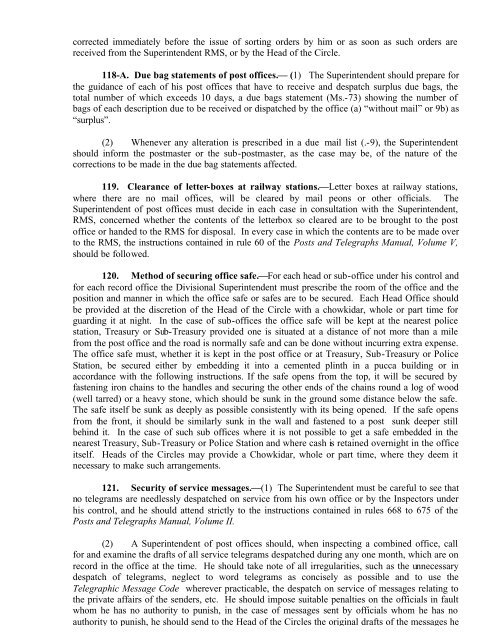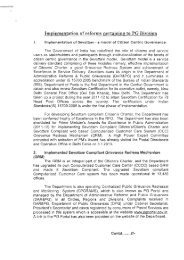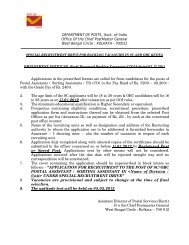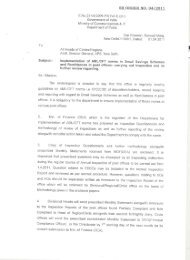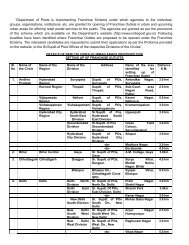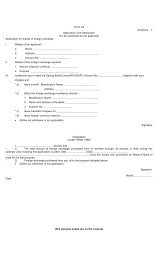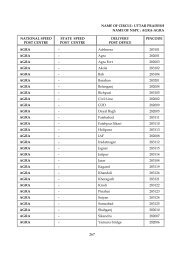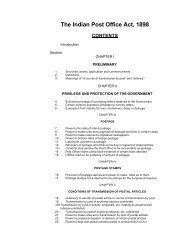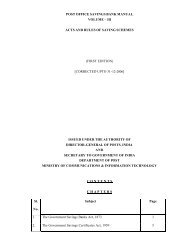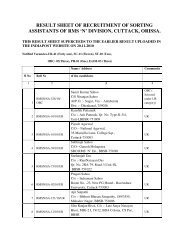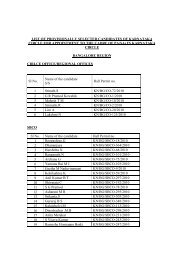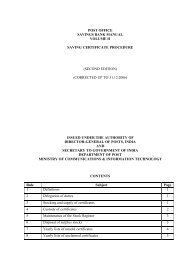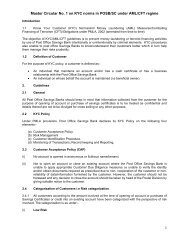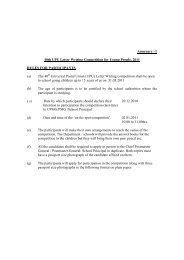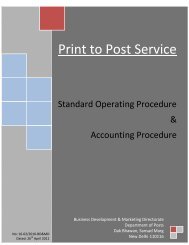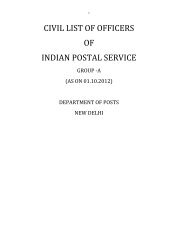Postal Manual Vol. VIII - India Post
Postal Manual Vol. VIII - India Post
Postal Manual Vol. VIII - India Post
Create successful ePaper yourself
Turn your PDF publications into a flip-book with our unique Google optimized e-Paper software.
corrected immediately before the issue of sorting orders by him or as soon as such orders are<br />
received from the Superintendent RMS, or by the Head of the Circle.<br />
118-A. Due bag statements of post offices.— (1) The Superintendent should prepare for<br />
the guidance of each of his post offices that have to receive and despatch surplus due bags, the<br />
total number of which exceeds 10 days, a due bags statement (Ms.-73) showing the number of<br />
bags of each description due to be received or dispatched by the office (a) “without mail” or 9b) as<br />
“surplus”.<br />
(2) Whenever any alteration is prescribed in a due mail list (.-9), the Superintendent<br />
should inform the postmaster or the sub-postmaster, as the case may be, of the nature of the<br />
corrections to be made in the due bag statements affected.<br />
119. Clearance of letter-boxes at railway stations.—Letter boxes at railway stations,<br />
where there are no mail offices, will be cleared by mail peons or other officials. The<br />
Superintendent of post offices must decide in each case in consultation with the Superintendent,<br />
RMS, concerned whether the contents of the letterbox so cleared are to be brought to the post<br />
office or handed to the RMS for disposal. In every case in which the contents are to be made over<br />
to the RMS, the instructions contained in rule 60 of the <strong>Post</strong>s and Telegraphs <strong>Manual</strong>, <strong>Vol</strong>ume V,<br />
should be followed.<br />
120. Method of securing office safe.—For each head or sub-office under his control and<br />
for each record office the Divisional Superintendent must prescribe the room of the office and the<br />
position and manner in which the office safe or safes are to be secured. Each Head Office should<br />
be provided at the discretion of the Head of the Circle with a chowkidar, whole or part time for<br />
guarding it at night. In the case of sub-offices the office safe will be kept at the nearest police<br />
station, Treasury or Sub-Treasury provided one is situated at a distance of not more than a mile<br />
from the post office and the road is normally safe and can be done without incurring extra expense.<br />
The office safe must, whether it is kept in the post office or at Treasury, Sub-Treasury or Police<br />
Station, be secured either by embedding it into a cemented plinth in a pucca building or in<br />
accordance with the following instructions. If the safe opens from the top, it will be secured by<br />
fastening iron chains to the handles and securing the other ends of the chains round a log of wood<br />
(well tarred) or a heavy stone, which should be sunk in the ground some distance below the safe.<br />
The safe itself be sunk as deeply as possible consistently with its being opened. If the safe opens<br />
from the front, it should be similarly sunk in the wall and fastened to a post sunk deeper still<br />
behind it. In the case of such sub offices where it is not possible to get a safe embedded in the<br />
nearest Treasury, Sub-Treasury or Police Station and where cash is retained overnight in the office<br />
itself. Heads of the Circles may provide a Chowkidar, whole or part time, where they deem it<br />
necessary to make such arrangements.<br />
121. Security of service messages.—(1) The Superintendent must be careful to see that<br />
no telegrams are needlessly despatched on service from his own office or by the Inspectors under<br />
his control, and he should attend strictly to the instructions contained in rules 668 to 675 of the<br />
<strong>Post</strong>s and Telegraphs <strong>Manual</strong>, <strong>Vol</strong>ume II.<br />
(2) A Superintendent of post offices should, when inspecting a combined office, call<br />
for and examine the drafts of all service telegrams despatched during any one month, which are on<br />
record in the office at the time. He should take note of all irregularities, such as the unnecessary<br />
despatch of telegrams, neglect to word telegrams as concisely as possible and to use the<br />
Telegraphic Message Code wherever practicable, the despatch on service of messages relating to<br />
the private affairs of the senders, etc. He should impose suitable penalties on the officials in fault<br />
whom he has no authority to punish, in the case of messages sent by officials whom he has no<br />
authority to punish, he should send to the Head of the Circles the original drafts of the messages he


